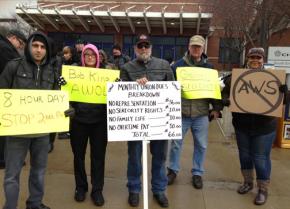Protesting Chrysler’s rip-off
and report on anger among Chrysler autoworkers over a company plan, backed by the union, to squeeze more work from them.
WORKERS AT Chrysler's stamping plant in Warren, Mich., are fighting back against a union-backed policy that would adjust work schedules and cut into overtime pay.
The new alternative work schedule--or AWS, dubbed the "awful work schedule" by autoworkers--will replace the traditional schedule of two shifts at 60 hours a week (with 20 hours of overtime) with a so-called "3-2-120" schedule: three crews, two shifts, 120 hours of production.
The AWS rearranges workers' schedules so that two out of the three shifts are now working Saturdays at straight time, rather than at time-and-a-half, which is traditional. The schedule also increases total production time for the plant, meaning more profit for the bosses, while workers lose pay and leisure time.
In a staggering betrayal, the United Auto Workers (UAW) leadership--most notably, UAW Vice President General Holiefield--have supported the new AWS, claiming it will ensure new jobs in the auto industry by keeping production at pace with growing demand. Chrysler went from producing 950,000 vehicles in 2009 to 2.4 million after its merger with Fiat, and it's aiming to produce 2.6 million in 2013.

The UAW's contract with Chrysler was adjusted in 2011 to allow Holiefield to approve new schedules on a plant-by-plant basis. Since then, the AWS has been used in plants across the country. "Workers at nearly all of those locations complained," Holiefield told the Detroit Free Press, "but eventually adjusted."
At a company town hall meeting last December, Holiefield took the stage to sell the AWS to the rank-and-file, saying it helps "the company to operate at maximum capacity to meet customer demand...and in general, employees understand the reasons for the schedule."
"Holiefield had already agreed to the schedule changes before the town hall meeting," one worker said of her experience at the town hall. "The workers were given no choice at all in the matter."
But Chrysler workers have been fighting back. During the town hall, the front row in the audience stood up and turned their backs to Holiefield.
In several ways, the new schedules mimic the two-tier system agreed to by the UAW leadership, with only one of the three crews not having to work on Saturdays. "My biggest problem," one Chrysler autoworker told reporters, "is just with how good the first shift, the A shift, schedule is compared to B and C shift."
The new schedules would greatly disrupt workers' lives. One Chrysler worker named Annette, who joined about three-dozen of her co-workers in a protest outside Warren Stamping plant last week, said that the new schedule would make her miss important time with her 13-year old son, who plays football on Saturdays.
"Already, the merry-go-round has started," wrote Alex Wassell, a welder repair technician at Warren Stamping, in Labor Notes, "with 40 day-shift forklift drivers filing papers to go back to the line, bumping another crew so they can stay on days."
Wassell is co-founder of the in-plant Committee for the Eight Hour Work Day and Overtime Pay, and was indefinitely suspended by Chrysler after last week's protest, with no support given to him by the UAW leadership.
Chrysler workers have not been put down by intimidation, however. "There is a lot of discontent on the plant floor," one autoworker told reporters. Workers have already discussed the possibility of pickets at Chrysler headquarters and union offices, as well as in-plant resistance.


